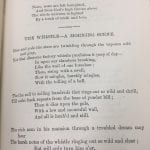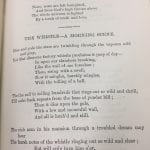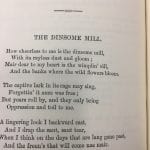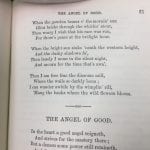
V: “The Whistle” and “The Dinsome Mill”
“The Whistle” and “The Dinsome Mill” are by Perthshire poet William Pyott. Most likely these two companion poems were published in his first collection of 1869, which I have not managed to trace. Contemporary writer Robert Ford identifies Pyott as a millworker and son of a mill overseer, who started work in a flax mill (an example of a flax mill can be seen above) in Blairgowrie at the age of 12. Ford gives his date of birth as 1851, meaning that these poems were most likely written in his early-mid teens.
“The Whistle”
“The Whistle” is a formally striking poem, and its abruptly broken and varied lines might be said to mimic the disruption to the natural rhythms of human life by the brutal mechanical time of industry. Repetition of lines and phrases also mimics the “echo” of the whistle. Pyott emphasizes the bitter comparison between the careless rich and the working poor, and the former’s failure to recognize the suffering outside their doors.
Dim and pale the stars are twinkling through the vapours cold and grey,
Yet that dinsome factory whistle proclaims it peep of day –
In upon our slumbers breaking,
Like the wail of one forsaken;
Then, rising with a swell,
Now it mingles, harshly mingles,
With the tolling of a bell.
**
Now toiling groups are hurrying fast, fast along the street,
And the frozen earth re-echoes to the tramp of many feet;
Then all is din and bustle,
As they jostle, push, and jostle,
While the last shriek of the whistle dies away.
And men commence to toil,
Though from that some hearts recoil,
While down Time’s stream slow rolls another day.
- The Whistle, pg. 1
- The Whistle, pg. 2
- The Whistle, pg. 3
“The Dinsome Mill”
“The Dinsome Mill” focuses on the noise, darkness and dust of the mill, with “whirlin’ stour” a particularly evocative phrase for the flax-dust that would have filled the air. The large textile mills of Perthshire were not set in industrial cities but in beautiful rural locations, so Pyott’s repeated vision of the clear stream and flowers is all the more tantalizing because it is a local pleasure, which would be accessible if he were not trapped in the mill for all the daylight hours.
How cheerless to me is the dinsome mill,
With its rayless dust and gloom;
Mair dear to my heart is the wimplin’ rill,
And the banks where the wild flowers bloom.
The captive lark in its cage may sing,
Forgettin’ it ance was free;
But years roll by, and they only bring
Oppression and toil to me.
**
When the gowden beams o’ the morning sun
Glint bricht through the whirlin’ stour,
Then weary I wish that his race was run,
For there’s peace at the twilight hour.
Then I am free frae the dinsome mill,
Where the walls so darkly loom;
I can wander awhile by the wimplin’ rill,
’Mang the banks where the wild flowers bloom.
- The Dinsome Mill, pg. 1
- The Dinsome Mill, pg. 2




